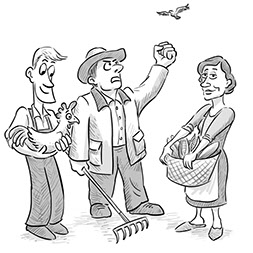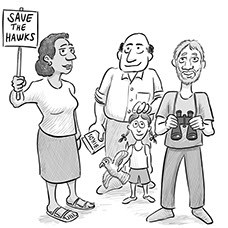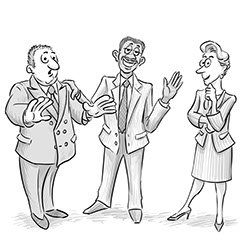Meet the Community
 The farmersare confused and angry about the rule. If a hawk is on THEIR private property, they should have every right to kill it. Losing chickens to these nasty predators is expensive, stressful, and very harmful to their business. Poultry farmers produce eggs and chickens consumed by people all over the state. They realize that the new rodent problem might be due to fewer hawks, but they prefer to try other ways to control the rodents. The environmental activists
The farmersare confused and angry about the rule. If a hawk is on THEIR private property, they should have every right to kill it. Losing chickens to these nasty predators is expensive, stressful, and very harmful to their business. Poultry farmers produce eggs and chickens consumed by people all over the state. They realize that the new rodent problem might be due to fewer hawks, but they prefer to try other ways to control the rodents. The environmental activists consider the hawk to be a beautiful bird with an especially important place in the community. They worry about hawks becoming an endangered species. They know that ecosystems are complicated and interdependent, and they worry that other people don’t think about unintended consequences. Furthermore, they are suspicious that the farmers will use poison to control the rodents, which they think could be very harmful.
consider the hawk to be a beautiful bird with an especially important place in the community. They worry about hawks becoming an endangered species. They know that ecosystems are complicated and interdependent, and they worry that other people don’t think about unintended consequences. Furthermore, they are suspicious that the farmers will use poison to control the rodents, which they think could be very harmful.
The fish and game warden and wildlife biologists want to prevent harmful disturbances to the environment and to protect native species. They are concerned about the rodent population becoming too large, thereby hurting natural grasslands and farm crops. They are not sure how long the ban on hawk-killing should last. They are a bit worried that the county councilors will change the rule because of complaints and not because of scientific evidence. The county councilors
want to prevent harmful disturbances to the environment and to protect native species. They are concerned about the rodent population becoming too large, thereby hurting natural grasslands and farm crops. They are not sure how long the ban on hawk-killing should last. They are a bit worried that the county councilors will change the rule because of complaints and not because of scientific evidence. The county councilors are the elected representatives of the people of Cluck County. They want to do the responsible thing, but they also want to keep everyone happy. They are worried about the rule disturbing the farmers’ businesses. They respect the scientists and the game warden, but wonder if they overreacted by banning all killing of hawks and birds of prey. They are also somewhat concerned that the environmental activists will organize demonstrations against the rule, which they believe would make the county look bad.
are the elected representatives of the people of Cluck County. They want to do the responsible thing, but they also want to keep everyone happy. They are worried about the rule disturbing the farmers’ businesses. They respect the scientists and the game warden, but wonder if they overreacted by banning all killing of hawks and birds of prey. They are also somewhat concerned that the environmental activists will organize demonstrations against the rule, which they believe would make the county look bad.
